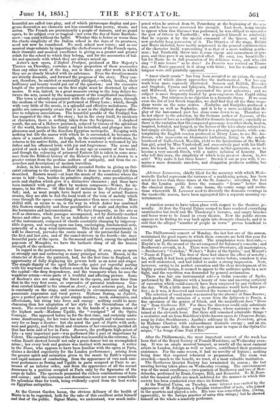The Philharmonic concert of Monday, the last but one of
the season, maintained the good repute in which these concerts arc held this year for careful and judicious management. The symphonies were first-rate,— Haydn's in D, the second of the set composed for Salomon's concerts ; and Beethoven's seventh, in A. There were three Overtures, all masterpieces, —Beethoven's " Coriolan," Weber's "Ruler of the Spirits," and Mozart's "Nozze di Figaro." The first of these had almost the effect of novelty ; for, although it had been performed once or twice before, somehow it was not well understood, and had failed to make a strong impression. Now, however, owing to its perfect execution and the clear development of its highly poetical design, it seemed to appear to the audience quite in a new light, and the repetition was demanded by general acclamation.
There was but one instrumental solo—a violin concerto of Spohr, performed by Mr. Blag,rove with a beauty of tone and unerring certainty of execution which could scarcely have been surpassed by any violinist of the day. With a little more fire, the performance would have been per- fect ; as it was, it deserved and received the warmest applause.
The selection of vocal music was marred by the absence of Sims Reeves ; which produced the omission of a scene from the Iphigenia in Teen's, a fine specimen of the genius of Gluck, and the magnificent duet "Dove vai " from Guillaume Tell. For these the directors could only substitute Mozart's "Non pin andrai," sung by Formes, whose assistance was ob- tained at the eleventh hour. But there still remained admirable things a recitative and air from Boieldicu's little-known opera Le Chaperon Rouge, sung by Jules Stockhausen ; Agatha's soliloquy in the .Freischetz, given by Madame Charton with extraordinary dramatic energy ; and an air, sung by the same lady, from the new opera now in vogue at the Opera Co- mique, " Le Songe d'une Nuit d'Ete."


























 Previous page
Previous page